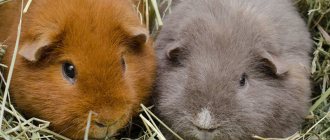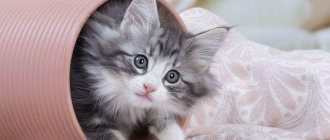Life cycle of mustachioed pets
The entire life cycle can be divided into 6 stages. Please note that they are all very conditional. Many cats remain playful and active even in their old age.
Infancy (up to 1 month)
Until 1 month, the kitten is completely dependent on the mother. In the first days after birth, he is blind and toothless, so communication with the outside world is very limited.
Childhood (up to 7-8 months)
With the appearance of the first baby teeth, the kitten begins to show more independence. He tries his first complementary foods and is actively learning new things.
At 2.5-4 months, the baby finally leaves his mother and learns to live independently. His molars gradually grow and puberty begins. By 7-8 months, female cats are already in their first heat, but they are still babies until their third heat.
Youth (up to 2 years)
At 1-1.5 years old males and female cats reach their first mating. They give birth to and raise their first offspring.
Youth (up to 4-5 years)
At this stage, breeders are actively breeding the breed. By age 5, most animals are removed for health reasons.
Maturity (up to 8 years)
The first behavioral changes appear. The cat becomes calmer and more reserved. She goes on crazy runs around the house less often, but still doesn't give up on games.
Old age (8-9 years and older)
At the final stage, there is a gradual attenuation of activity, an increase in sleep duration and the appearance of dental problems. The general well-being of the animal depends on the state of health.
In the absence of chronic diseases, significant changes are not observed. An elderly pet can be picky about food and show its devotion to its owner more clearly through affection and increased attention.
Famous long-lived cats
Judging by the cat life expectancy table, almost all native animals can be classified as long-lived breeds. Strong immunity and good health help them reach old age.
- The black and white cat Cream Puff from the USA lived for 38 years, this record is recorded in the Guinness Directory. The owner said that she really loved asparagus, broccoli and beans.
- The famous mongrel cat Lucy. The owner said that she was born in 1972 and lived for at least 46 years. But no supporting documents were ever found.
- English mongrel Nutmeg was recognized as the oldest cat in Britain - he died at 32 years old. It is noteworthy that he came into the home of his owners at the age of 5, and before that he was an ordinary street animal.
- The maine coon Rubble from England is considered the leader in the long-living rating. He is 32 years old and his owner says he is doing very well.
Owners of domestic cats rarely set themselves the task of raising an “honorary pensioner,” but they are always happy to extend the life of their beloved pet. Today, there are all the necessary opportunities for this: high-quality feed, veterinary services, hygiene products. And the person can only add his love and attention.
What determines the lifespan of cats?
The lifespan of cats depends on a number of external and internal factors. Some contribute to its increase, while others contribute to its reduction.
What promotes longevity
Anything that has a beneficial effect on health is responsible for longevity. These include:
- balanced diet;
- timely vaccination, deworming and treatment against external parasites;
- absence of hormonal surges;
- safe maintenance to prevent injury;
- Regular visits to the veterinarian for preventive purposes.
All of the above are completely inaccessible to street cats. For this reason, they always die earlier than domestic ones.
What shortens years of life
Factors that reduce immunity and undermine health have the opposite effect. These include:
- living in unfavorable conditions (frequent temperature changes, dampness, unsanitary conditions);
- lack of regular nutrition, consumption of low-quality foods and lack of vitamins;
- genetic predisposition to certain pathologies;
- frequent pregnancies and childbirths;
- infection;
- free range, fraught with injury or death under the wheels of vehicles;
- frequent and prolonged stress;
- excess weight, which provokes problems with the musculoskeletal system and hormonal disorders.
All of the above can significantly reduce the allotted years by more than 2 times.
What diseases do mixed-breed cats suffer from?
If you do not intend to breed your cat, have your pet spayed or neutered by 5 months of age. Be sure to stay up to date with vet visits and vaccinations to prevent common and serious problems.
Mixed breeds generally have a healthier appearance because they are not susceptible to breed-specific diseases. Although no cat is 100% free from health problems.
The following diseases can be listed as the most common among all cats:
- Cancer : Common in older cats, be on the lookout for any tumors or unusual skin changes. Lymphoma is a common cancer in cats.
- Diabetes : Obese male and older cats are at greatest risk.
- Feline Immunodeficiency Virus : Spread from cat to cat when they fight and receive deep bites. To prevent this, keep your cat indoors and away from territorial or aggressive cats.
- Feline leukemia virus damages the immune system and makes cats more susceptible to developing blood cancer. To reduce the risk of infection, cats can receive the feline leukemia virus vaccine.
How many years do street cats live?
Approximately 85% of animals born on the streets die as kittens. This occurs due to weakened immunity, low temperatures, infections, parasites and poisoning. Stronger individuals usually live up to 4-8 years.
The worst situation is for domestic cats that are lost or abandoned by their owners. Being unadapted to such harsh conditions, they die from stress, cold and hunger within the first 3 years.
Life of a street and indoor cat
Life expectancy is affected by habitat. Well-groomed and caressed domestic cats live much longer than their street counterparts. The latter have to survive, get food, and hide from the cold in winter. In the cold, death from hypothermia overtakes animals quite quickly.
Kittens born in the basement or on the street die in the first months of life in 90% of cases. The reason for this is weakened immunity, lack of heat and viral diseases. Only the strongest survive, but they have yet to prove their strength in street fights. It is not surprising that they have a short life span - few live up to 7 years, and a 10-year-old street cat will be considered a long-liver.
Animals that end up outside from home find themselves in even worse conditions. Most often, the owners refuse them, indifferently throwing them away like an unnecessary rag. The chances of living at least a year on the street for cats unadapted to such conditions are negligible.
The life of a pet is a different matter. There is good food in the bowl, a warm bed in the room. Vitamins and vaccinations protect against diseases; at the slightest deviation, a caring owner will take all measures to restore the pet’s health.
Life expectancy of cat breeds at home
Longevity directly depends on the breed. Most artificially bred breeds are characterized by hereditary diseases that reduce the number of years allotted. This explains why the average age of mongrel cats that have escaped human intervention is often 5 years older.
Average and maximum indicators: table
The average and maximum age indicators characteristic of purebred animals can be found in the example table. It presents the 10 most popular representatives of the cat family.
| Breed name | Lifespan | |
| Average | Maximum | |
| Siamese | 15 | 20 |
| Scottish | 15 | 20 |
| Russian blue | 14 | 19 |
| Bengal | 13 | 16 |
| Maine Coon | 12,5 | 16,5 |
| Persian | 10-17 | 20 |
| British | 12 | 16 |
| Siberian | 15 | 20 |
| Abyssinian | 12-15 | 20 |
| Sphinx | 13 | 14 |
Most of these breeds do not live to their maximum age due to chronic renal failure, urolithiasis, polycystic kidney disease and cardiovascular pathologies.
Long-lived breeds
Long-livers include all representatives of the Siamese-Oriental group, Maine Coons, Siberians and other aboriginal breeds. All of them were able to avoid direct human intervention in their long history of development and went through the most reliable selection - natural selection. Thanks to him, Aboriginal cats received strong immunity and good health.
Maximum age of a cat
The Guinness record holder is the long-lived cat Cream Puff, who lived a little over 38 years. Among the living, the leader in life expectancy is the British mongrel pet Lucy, she is already 43 years old. Such indicators are typical for Western countries, where pets are sometimes treated even better and more attentively than family members.
Which cats live the longest?
Naturally, breeders try to choose a breed not only by appearance, but also by life expectancy. It is normal to want your beloved pet to stay close to you for as long as possible. The leaders in life expectancy are Siamese, Bengal, Persian, Siberian and Maine Coon cats. The minimum age in our country for sphinxes is due to the fact that the climate is absolutely unsuitable for the breed, and home maintenance is rarely maintained at the required level.
- 15 things in your home that can go bad and become dangerous
- Where does the pension money of those who do not live to retire go?
- Skin fungus on the legs - how to treat it
How castration or sterilization affects longevity
Contrary to popular belief, surgery to deprive reproductive function does not shorten, but prolongs the life of your pet. This happens thanks to:
- softening of character (the cat stops getting into fights and looking for adventures);
- prevention of oncology and sexually transmitted diseases;
- absence of hormonal surges due to medications, pregnancy and childbirth.
Frequent birth and feeding of kittens greatly wears out the body. He suffers not only physically, but also emotionally. After sterilization, this problem completely disappears, as does the possibility of developing cancer. Thanks to the operation, the overall life expectancy is increased by 3 years.
The only disadvantage for castrated animals is their tendency to become obese. Due to a slower metabolism, they gain weight faster, so their diet must be strictly controlled.
Characteristics of a yard cat
| Attachment level | Average |
| Friendliness | Average |
| Suitable for children | Average |
| Loyalty to other pets | Average |
| Exercise needs | Average |
| Playfulness | Average |
| Energy level | Average |
| Intelligence | High |
| Tendency to meow | Average |
| Shedding intensity | Average |
Ways to help prolong the life of a pet
If your cat is approaching her final stage, don't despair. After all, for many, life after 8 years is just beginning. By following a number of recommendations, this period can be extended as long as possible.
Proper nutrition
Don't skimp on the quality of your products. Buy meat, vegetables and dairy products in trusted places or choose ready-made food of at least premium quality.
Be sure to follow the feeding schedule, avoiding overfeeding and handouts from the table. Remember that on a natural diet you must add vitamins prescribed by your veterinarian to your food.
Competent care
Avoid the formation of tangles and strong darkening of tooth enamel. Brush your pet 1-2 times a week and brush his teeth every month.
Also remember to keep your eyes and ears clean. Remove any secretions that accumulate in them and be sure to contact a veterinarian if an unpleasant odor or foreign matter appears.
Pay special attention to physical activity. Monitor your cat's weight and don't let him nap on the couch too often. Outdoor games improve health, promoting longevity.
Vaccinations and disease prevention
Most infections can be prevented through vaccination. The first vaccination followed by revaccination is given when the child reaches 2 months of age. With the onset of the year, the frequency of grafting reaches no more than 1 time per year.
In addition to viruses and bacteria, you should be wary of parasites and genetic pathologies. To prevent them, it is necessary to promptly treat with anthelmintic and acaricidal drugs and undergo an annual preventive examination at a veterinary clinic.
No stress
The family situation plays a big role. The absence of quarrels between owners and a reverent attitude towards the pet have a positive effect on mental health.
Sexual health
When participating in breeding, all rules must be strictly followed. Do not attempt to start your breeding career early or exceed the recommended birth rate. Bearing offspring is always accompanied by severe nervous tension and hormonal changes, so timely retirement is very important here. Otherwise, the animal risks not living to its allotted time.
If breeding and selling kittens is not part of your plans, sign up your pet for castration immediately after puberty. This will protect her from cancer and other dangerous complications associated with hormones. A similar choice should be made regarding the cat.
Requirements for the place of detention
Pets should be kept in a warm and clean environment. Locate the sleeping area away from drafts and prohibit your pet from sleeping on a tiled floor. To avoid hypothermia, be sure to accustom your cat to a bed or install an underground heating system.
Don't forget to change the litter in the tray, wash food bowls after each feeding and change the water daily. Remember that not only freshness is important, but also the absence of foreign impurities. Water must be purchased from a store or passed through a filter to remove any sediment it contains.
What can you do to prolong your cat's life?
Don’t despair if your pet is approaching the “average” age. Each owner can extend the life of his pet by following only a few rules:
- closely monitor the well-being of your furry friend and immediately contact a veterinarian at the slightest deviation in behavior;
- promote cat physical activity;
- do not allow self-walking;
- sterilize the animal;
- wisely select a diet containing proteins, vitamins, and minerals;
- take care and give affection to your pet, do not expose it to stress.
Approximately 30% of domestic cats suffer from chronic renal failure. It is impossible to completely cope with the disease, but if you notice it in time, you can maintain your pet’s health and significantly extend its life.
Cat to human age ratio
The most popular method of converting a cat's age to a human age is 1 to 7. Despite this, it is the most unreliable. Instead, they are increasingly using a scheme with a slow growth rate. In it, 1 year is equated to 15 years, 2 years to 9, and each subsequent year to 4. That is, a one-year-old cat is a 15-year-old teenager, the same animal at the age of 2 is a 24-year-old independent man, and at 3 and 4 years, the age of the mustache is equated to 28 and 32 years, respectively.
Veterinarians usually adhere to the scheme from the international veterinary passport. According to him, the ratio is as follows:
| Cat age (years) | Human age (years) |
| 1 | 18 |
| 2 | 25 |
| 3 | 30 |
| 4 | 35 |
| 5 | 40 |
| 6 | 43 |
| 7 | 45 |
| 8 | 50 |
| 9 | 55 |
| 10 | 60 |
| 11 | 62 |
| 12 | 65 |
| 13 | 68 |
| 14 | 72 |
| 15 | 74 |
| 16 | 76 |
| 17 | 78 |
| 18 | 80 |
| 19 | 90 |
| 20 | 100 |
But here everything is very conditional. Maine Coons and Siberians have a very long adolescence, so at 4-5 years their psychological age is close to adolescence.
How to survive the death of a cat
Losing a pet at any age is a difficult loss. But sooner or later this happens to all animals. When the time comes to say goodbye to your cat, life can suddenly feel very empty.
Don't blame yourself, but don't hold back your feelings if you want to be sad and cry. This is a normal psychological reaction to the loss of a full family member, friend, companion.
Put away all the things of the deceased animal, the remaining food, litter for the tray, or better yet, take them to the shelter. Take a closer look at the shelter's inhabitants. Perhaps you can give your love to another animal
If your heart is not yet ready to open to another cat, donate as much as you can to a charity or animal shelter.
Read how to find and adopt a kitten at a shelter.
Determining the age of a kitten or adult cat
It is impossible to determine the exact age of an animal taken from the street, but an approximate age is not at all difficult. Veterinarians determine it by external signs: the condition of the teeth, fur, mustache, eyes and musculoskeletal system.
The older the cat, the more worn out his teeth are. Very old individuals may lack incisors and fangs. Also, with aging, dulling and thinning of the coat is noted. By the age of 10, the first gray hair appears, spreading from the fur coat even to the mustache. The animal's eyes become dull and the spine begins to sag. The gait loses its former confidence, and the claws lose flexibility.
Pros and cons of a mixed-breed barn cat
pros
- As a mixed breed, a cat has a lower risk of developing breed-specific diseases.
- Most mixed breeds have a longer than average life expectancy.
- These cats usually have no special diet or care requirements.
Minuses
- If you have a mixed breed, you usually don't know the cat's pedigree and may not be aware of any history of health problems.
- Unlike pedigree cats, which share common traits, you won't know your cat's characteristics until she's grown.
How to extend the life of your pet: tips for owners
In order for the cat to please its owners and be healthy, it is necessary to follow simple recommendations from veterinarians:
- Provide balanced nutrition and access to fresh water. Wet and dry food should be given in portions, since exposure to air causes it to weather and deteriorate, which can lead to poisoning and intestinal problems.
- Regular examination at the veterinary clinic will allow timely diagnosis of the disease. Cats are good at hiding pain, so any changes in the animal’s behavior are a reason to consult a doctor. You should not refuse to vaccinate your pet, even if it does not go outside.
- Neutered animals lead a calm and safe life, so timely sterilization should be carried out.
- Physical activity and games are the key to health and long life, and the attention of the owner and communication with people make cats happy.
- You cannot neglect the basic rules of caring for your pet. Timely deworming, flea treatment and teeth cleaning will help improve your cat's quality of life.
Factors influencing a pet's lifespan
At home, cats can live a long time if their owners show attention and care. Veterinarians advise paying attention to several important factors:
- Nutrition. With a balanced diet, the animal’s body receives all the necessary vitamins and nutrients. Proper nutrition allows cats to stay healthy longer and lead an active lifestyle. Your pet's weight should be monitored, as obesity causes many serious diseases, including diabetes.
- Stress. Cats that are in close contact with their owner live much longer. The cause of stress may be the indifference of the owner, regular punishment or lack of attention. Excessive fuss, constant quarrels in the house and loud noise can lead to cardiac arrest of the animal.
- Genetics and chronic diseases of cats. Bad heredity significantly shortens a pet’s life, which is why half-breeds are considered healthier. To highlight the main characteristics of the breed, breeders practice mating between close relatives, which increases the risk of transmitting genetic diseases. Chronic diseases are incompatible with longevity because they attack important systems in the animal's body.
Characteristic hereditary diseases are often associated with traits that are specifically bred for a particular breed. Distinctive characteristics based on gene mutations are found in Scottish Folds, Manxes, Persians (an extreme variant with a very flat muzzle), Burmese and Oriental Orientals.
- Acquired diseases. Not all cat diseases become immediately noticeable, so veterinarians advise regular examinations of your pet in the clinic. Obvious signs are characteristic of the acute stage of chronic diseases, when maintenance therapy is introduced as treatment.
- Cat care. Living conditions can affect a pet's lifespan. Physical injuries, accidental poisoning, the presence of parasites and lack of food negatively affect the cat's health, reducing its stay on the ground.











